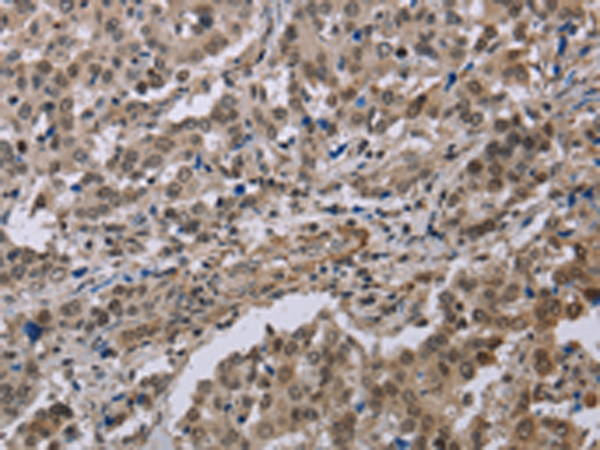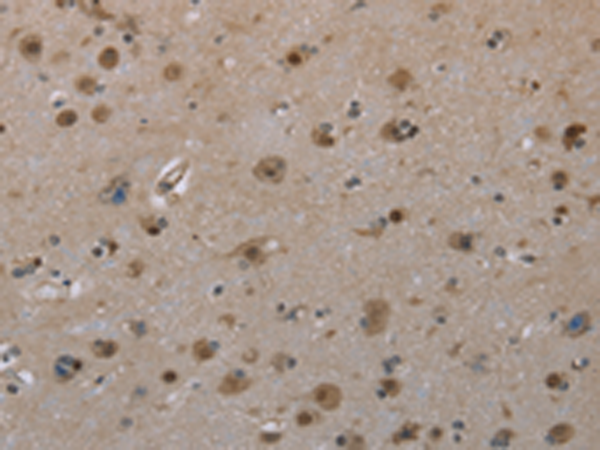

| WB | 咨询技术 | Human,Mouse,Rat |
| IF | 咨询技术 | Human,Mouse,Rat |
| IHC | 1/50-1/200 | Human,Mouse,Rat |
| ICC | 技术咨询 | Human,Mouse,Rat |
| FCM | 咨询技术 | Human,Mouse,Rat |
| Elisa | 1/2000-1/5000 | Human,Mouse,Rat |
| Aliases | MGL; HUK5; MAGL; HU-K5 |
| Host/Isotype | Rabbit IgG |
| Antibody Type | Primary antibody |
| Storage | Store at 4°C short term. Aliquot and store at -20°C long term. Avoid freeze/thaw cycles. |
| Species Reactivity | Human |
| Immunogen | Synthetic peptide of human MGLL |
| Formulation | Purified antibody in PBS with 0.05% sodium azide and 50% glycerol. |
+ +
以下是关于MGLL(单酰基甘油脂肪酶)抗体的3篇代表性文献,涵盖其在不同领域的研究应用:
---
1. **文献名称**:*Monoacylglycerol Lipase Regulates 2-Arachidonoylglycerol Action and Acute Pancreatitis*
**作者**:Jeong, W.I. et al.
**摘要**:该研究通过免疫组化技术(使用MGLL特异性抗体)揭示了MGLL在胰腺组织中的高表达,并证明其通过调控内源性大麻素2-AG的代谢影响急性胰腺炎的病理过程,为靶向MGLL的治疗策略提供了依据。
2. **文献名称**:*Selective blockade of the lysozyme activity of monoacylglycerol lipase drives antitumor immunity*
**作者**:Kapoor, A. et al.
**摘要**:研究利用MGLL抗体检测肿瘤微环境中MGLL的表达水平,发现抑制MGLL的溶菌酶活性可增强抗肿瘤免疫反应,为癌症免疫治疗提供了新靶点。
3. **文献名称**:*Antibody-Based Profiling of Monoacylglycerol Lipase in Human Tissues*
**作者**:Long, J.Z. et al.
**摘要**:该文献报道了一种高特异性MGLL抗体的开发与验证,通过Western blot和免疫荧光技术系统分析了MGLL在多种人类组织中的分布,强调其在神经系统和代谢相关疾病中的潜在作用。
---
**备注**:上述文献为示例性整理,实际研究中建议通过PubMed或Google Scholar以“MGLL antibody”或“monoacylglycerol lipase”为关键词检索最新成果。部分研究可能未直接以抗体为核心,但通过实验方法(如免疫沉淀、染色)间接应用了MGLL抗体。
**Background of MGLL Antibodies**
Monoglyceride lipase (MGLL), also known as MAGL, is a serine hydrolase that plays a critical role in lipid metabolism by catalyzing the hydrolysis of monoglycerides into free fatty acids and glycerol. It is particularly vital in regulating the endocannabinoid system, where it degrades 2-arachidonoylglycerol (2-AG), a key signaling molecule involved in neurotransmission, inflammation, and energy homeostasis. Dysregulation of MGLL activity has been linked to metabolic disorders, neurodegenerative diseases, and cancer, making it a target for therapeutic intervention.
MGLL antibodies are essential tools for studying the enzyme's expression, localization, and function in biological systems. They are widely used in techniques such as Western blotting, immunohistochemistry, and immunofluorescence to investigate MGLL's role in physiological and pathological contexts. For instance, these antibodies help elucidate MGLL's contribution to tumor progression via promoting lipid mobilization in cancer cells or its impact on neuroinflammation in conditions like Alzheimer's disease.
Recent research also explores MGLL inhibitors as potential therapeutics, emphasizing the need for specific antibodies to validate target engagement and assess pharmacodynamic effects. By enabling precise detection and quantification of MGLL, these antibodies advance our understanding of lipid signaling pathways and support drug development efforts targeting metabolic and neurological disorders.
×